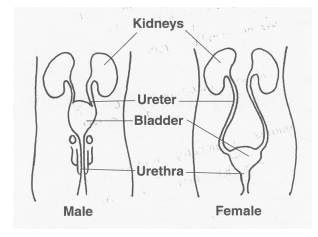Urinary Tract Infections
Please note, this page is printable by selecting the normal print options on your computer.
What is a urinary tract infection (UTI)?
It is an infection of some part of the urinary tract, (meaning a water infection or kidney infection).
See the diagram below

What is the cause?
The causes can include:
• Bugs/bacteria from the skin or the back passage getting into the urinary tract via the urethra;
• An abnormal urinary system – a risk factor for recurrent UTI
A urine infection is not a sign that the child has been left unclean but simply that the area around the bottom has germs present.
What are the symptoms?
These depend on your child’s age. Under 3 months: the symptoms are rather non-specific. They may include:
• Fever
• Vomiting
• Lethargy [tiredness]
• Poor weight gain and poor feeding
• Abdominal pain
• Irritability / excessive crying
• Jaundice
• Offensive smelling urine
Over 3 months: the symptoms include:
• Incontinence (wetting themselves) in a toilet trained child
• Fever
• Strong smelling, cloudy urine
• Frequency in passing urine (passing urine more often than usual).
• Tummy and loin pains
• Pain on passing urine
• Sometimes there is blood in the urine (often impossible to see with the naked eyes, but the urine may appear darker colour).
• Vomiting
• Reduced feeding and poor weight gain
• Lethargy and irritability
How does the doctor confirm it?
By testing a sample of urine. A urine sample maybe obtained:
• Midstream urine in toilet-trained child with a little sterile pot held under the child (the cleaner sample)
• Via a catheter (a small tube) into the bladder through the urethra
• Via a suprapubic aspirate
We often require two samples of urine for testing.
• It is important to ensure the nappy area is cleaned thoroughly using warm water and cotton wool before collecting a sample.
• No cream or talc should be used on the area cleaned before the urine sample has been obtained. Sometimes the test sample may be contaminated with germs from the child’s skin or back passage in which case we will need to repeat the test. Final results of the test usually take 2 – 3 days. If the results show that there is an infection, the hospital will get in touch with you or your family doctor (GP) to advise on treatment.
How is it treated?
With antibiotics either orally (by mouth) at home, or intravenously (into a vein) in hospital. Encourage plenty of fluids to prevent dehydration. Simple analgesia eg paracetamol can be given to treat pain and fever.
How can you prevent your child getting repeated urinary tract infections?
The following suggestions may help:
• If you have a girl, make sure she knows how to wipe her bottom properly (from front to back).
• Shower/bathe your child regularly. However, avoid using bubble bath in your child’s bath water as it may irritate and increase the risk of infection.
• It is recommended that you do not wash your child’s hair whilst they are taking a bath as the shampoo will end up in the bath water and may also cause irritation.
• Using cotton underwear for your child and ensuring your child removes underwear before they go to bed.
• Encourage your child to regularly pass urine and that your child completely empties their bladder by counting to 10 after passing urine and then trying to pass urine again.
• Make sure that your child feels comfortable using the toilet at school.
• Encourage your child to drink plenty as it will help to flush their system and dilute their urine so that it does not sting when passed. Try to avoid too many fizzy drinks or drinks that contain caffeine.
• Making sure your child eats a healthy balanced diet as this will ensure your child does not become constipated.
Other Investigations
Depending on the age of the child, organism causing UTI or if a recurrence of UTI, other investigations may be needed. See separate leaflet on tests and investigations.
Further Information
Ward 5 Telephone No: 01908 996377
Paediatric Community Nurses Telephone No: 01908 996518
Paediatric Day Assessment Unit Telephone No: 01908 996367
